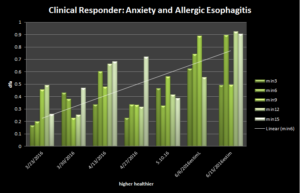Adaptive Homeostasis: Beyond Hormesis: Acupuncture as Illustration
Kristen Sparrow • October 21, 2016

I maintain that acupuncture is a form of hormesis. After listening to the latest Ferriss podcast about raptomycin and metformin for life extension, I just shake my head. Risk/benefit not defined if you’re going to use them for life extension. Acupuncture is self regulating, urging the body to heal itself. The most elegant of remedies. The tiny injury that causes multiple cascades of neurotransmitters, immune response, and nervous system calming. (Update 12.30.16. As I’m rereading this post as a year end review, it makes me think that gradually increasing acupuncture stimulation might lead to better results and more definitive stress reduction. Only a hypothesis!)
“‘The transient expansion or contraction of the homeostatic range in response to exposure to sub-toxic, non-damaging, signaling molecules or events, or the removal or cessation of such molecules or events.’
Your resilience with acupuncture in the chart below.
Adaptive homeostasis.
Abstract
Homeostasis is a central pillar of modern Physiology. The term homeostasis was invented by Walter Bradford Cannon in an attempt to extend and codify the principle of ‘milieu intérieur,’ or a constant interior bodily environment, that had previously been postulated by Claude Bernard. Clearly, ‘milieu intérieur’ and homeostasis have served us well for over a century. Nevertheless, research on signal transduction systems that regulate gene expression, or that cause biochemical alterations to existing enzymes, in response to external and internal stimuli, makes it clear that biological systems are continuously making short-term adaptations both to set-points, and to the range of ‘normal’ capacity. These transient adaptations typically occur in response to relatively mild changes in conditions, to programs of exercise training, or to sub-toxic, non-damaging levels of chemical agents; thus, the terms hormesis, heterostasis, and allostasis are not accurate descriptors. Therefore, an operational adjustment to our understanding of homeostasis suggests that the modified term, Adaptive Homeostasis, may be useful especially in studies of stress, toxicology, disease, and aging. Adaptive Homeostasis may be defined as follows: ‘The transient expansion or contraction of the homeostatic range in response to exposure to sub-toxic, non-damaging, signaling molecules or events, or the removal or cessation of such molecules or events.’


